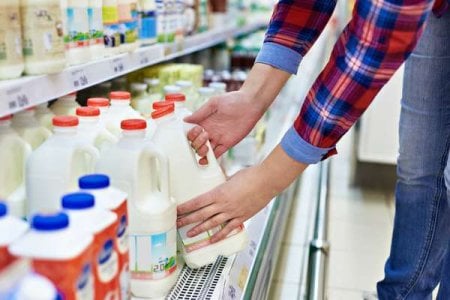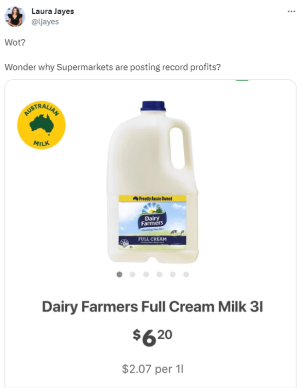Why are you paying more for milk at Coles, Woolworths and ALDI? The truth behind rising prices
We’ve often heard the saying 'nothing lasts forever', and as far as milk prices go, sadly, that's true.
In the last few years, the price of all those luscious litres of milk–both branded and home-brand offerings from Coles and Woolworths–has soared by nearly 50%. It’s easily made us wonder why we’re paying more for our favourite dairy staple–and made us even more cynical about the profits big businesses make from the stuff that keeps us going.
So when prominent Aussie journalist Laura Jayes posted on social media this week about a three-litre bottle of Dairy Farmers full cream milk being sold for a whopping $6.20 at Woolies, it rubbed salt in the wound of this long-standing problem.
'Wonder why supermarkets are posting record profits?' she asked.
But while most of us probably assumed we were getting ripped off, it turns out that the truth is more complicated.
It all started in 2011 when Coles famously slashed the price of its home-brand milk to just $1 per litre. Of course, Woolworths–their biggest rival–wanted a slice of that hypothetical pie, so it followed suit and matched Coles’ prices.
As convenient and tempting as the deal was for shoppers, though, it ended up being a death sentence for Aussie dairy farmers, who were left struggling to keep their heads above water after prices for their produce had stagnated due to the supermarkets' decision.
Woolworths finally took a step forward, hiking their home brand's price to $1.10 in February 2019, promising to pass the extra 10c directly to drought-stricken dairy farmers.
It was a move that made other supermarkets sit up and take notice: Coles and ALDI had no choice but to follow suit and match both the price increase and the extra donation to the beleaguered dairy farmers.
Since then, the scales have tipped in the farmers’ favour, with farmgate prices increasing four out of five years and up more than 75% from six years ago.
That’s not to say the industry is entirely on the recovery. Years of sluggish prices and droughts have caused experienced farmers to flee, and the total value of Australia’s milk production has dropped by almost $1 billion. At the same time, demand for milk remains strong, painting the picture of an industry struggling to keep its pace with the needs of consumers and retailers paying more to get their hands on milk.

In a statement, Woolworths answered customer questions about the recent surge in milk prices.
'Farmgate prices are set by our suppliers–the milk processors–not by retailers. We have clear and transparent contracts which ensure that farmgate price rises offered by processors are passed through to us. Across the dairy cabinet, milk brands have increased their retail prices to reflect higher wholesale costs across the entire industry. We remain focussed on delivering value for customers across their shop, and we offer more than 6,000 specials every week.'
Australian Dairy Farmers President Rick Gladigau admitted that although milk prices have risen in the last few years, they are still comparable to what was being paid when Coles first dropped their price to $1 a litre (after considering the Consumer Price Index or CPI).
He also pointed out that at least for the time being, dairy farmers do get their share of the windfall.
'This time, it's different,' he said. 'The milk pricing has well exceeded what we thought was going to happen.'
Moreover, he assured Aussies that despite rising costs, they're doing the right thing by choosing Aussie-made brands.
'While the cost of milk has risen in recent times, it remains rich in calcium, contains more than ten essential nutrients and is one of the most cost-effective ways to nourish your family,' he said.

So, members, if you’re concerned about how rising milk prices could affect your hard-earned savings, don’t worry–as long as you’re picking Aussie brands, you can rest assured that your buck is going to the hardworking dairy farmers.
Have you noticed this price increase in your local supermarket, dear members? What do you think about it? Share your thoughts in the comments below!
In the last few years, the price of all those luscious litres of milk–both branded and home-brand offerings from Coles and Woolworths–has soared by nearly 50%. It’s easily made us wonder why we’re paying more for our favourite dairy staple–and made us even more cynical about the profits big businesses make from the stuff that keeps us going.
'Wonder why supermarkets are posting record profits?' she asked.
But while most of us probably assumed we were getting ripped off, it turns out that the truth is more complicated.
It all started in 2011 when Coles famously slashed the price of its home-brand milk to just $1 per litre. Of course, Woolworths–their biggest rival–wanted a slice of that hypothetical pie, so it followed suit and matched Coles’ prices.
As convenient and tempting as the deal was for shoppers, though, it ended up being a death sentence for Aussie dairy farmers, who were left struggling to keep their heads above water after prices for their produce had stagnated due to the supermarkets' decision.
It was a move that made other supermarkets sit up and take notice: Coles and ALDI had no choice but to follow suit and match both the price increase and the extra donation to the beleaguered dairy farmers.
Since then, the scales have tipped in the farmers’ favour, with farmgate prices increasing four out of five years and up more than 75% from six years ago.
That’s not to say the industry is entirely on the recovery. Years of sluggish prices and droughts have caused experienced farmers to flee, and the total value of Australia’s milk production has dropped by almost $1 billion. At the same time, demand for milk remains strong, painting the picture of an industry struggling to keep its pace with the needs of consumers and retailers paying more to get their hands on milk.

Milk prices at leading supermarkets are rising due to various market factors. Credit: Sergey Ryzhov/Shutterstock
'Farmgate prices are set by our suppliers–the milk processors–not by retailers. We have clear and transparent contracts which ensure that farmgate price rises offered by processors are passed through to us. Across the dairy cabinet, milk brands have increased their retail prices to reflect higher wholesale costs across the entire industry. We remain focussed on delivering value for customers across their shop, and we offer more than 6,000 specials every week.'
He also pointed out that at least for the time being, dairy farmers do get their share of the windfall.
'This time, it's different,' he said. 'The milk pricing has well exceeded what we thought was going to happen.'
Moreover, he assured Aussies that despite rising costs, they're doing the right thing by choosing Aussie-made brands.
'While the cost of milk has risen in recent times, it remains rich in calcium, contains more than ten essential nutrients and is one of the most cost-effective ways to nourish your family,' he said.
Key Takeaways
- Home brand milk prices at Coles and Woolworths have surged 50% in the past few years, causing many customers to feel ripped off.
- The price war between Coles and Woolworths had initially resulted in stagnant prices for dairy farmers; however, the tide has turned in the farmers' favour, with farmgate prices rising four years out of five.
- Unfavourable conditions such as drought have forced some dairy farmers out of the industry, leaving less supply for a stable demand of milk.
- Due to soaring farmgate prices, milk processors are forced to charge supermarkets more for branded bottled milk, leading to higher retail milk prices.
- Australian Dairy Farmers President, Rick Gladigau, has indicated that some of the increased cost of milk is going back to the farmers and asserts that despite the price rise, dairy milk remains one of the most cost-effective ways to nourish a family. According to him, the increased costs are also proportionate to the Consumer Price Index since 2011.
So, members, if you’re concerned about how rising milk prices could affect your hard-earned savings, don’t worry–as long as you’re picking Aussie brands, you can rest assured that your buck is going to the hardworking dairy farmers.
Have you noticed this price increase in your local supermarket, dear members? What do you think about it? Share your thoughts in the comments below!









